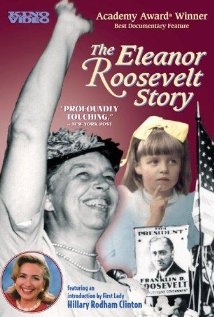
The Living Desert is a 1953 American nature documentary film that shows the everyday lives of the animals of the desert of the Southwestern United States. The film was written by James Algar, Winston Hibler, Jack Moffitt (uncredited) and Ted Sears. It was directed by Algar, with Hibler as the narrator and was filmed in Tucson, Arizona. The film won the 1953 Oscar for Best Documentary.

Sunrise at Campobello is a 1960 American biographical film telling the story of the struggles of future President of the United States Franklin D. Roosevelt and his family when Roosevelt was stricken with paralysis at the age of 39 in August 1921. Based on Dore Schary's 1958 Tony Award-winning Broadway play of the same name, the film was directed by Vincent J. Donehue and stars Ralph Bellamy, Greer Garson, Hume Cronyn and Jean Hagen.

I'm All Right Jack is a 1959 British comedy film directed and produced by John and Roy Boulting from a script by Frank Harvey, John Boulting and Alan Hackney based on the 1958 novel Private Life by Alan Hackney.

Francis Bosley Crowther Jr. was an American journalist, writer, and film critic for The New York Times for 27 years. His work helped shape the careers of many actors, directors and screenwriters, though some of his reviews of popular films have been seen as unnecessarily harsh. Crowther was an advocate of foreign-language films in the 1950s and 1960s, particularly those of Roberto Rossellini, Vittorio De Sica, Ingmar Bergman, and Federico Fellini.
Edward Anhalt was an American screenwriter, producer, and documentary filmmaker. After working as a journalist and documentary filmmaker for Pathé and CBS-TV, he teamed with his wife Edna Anhalt, one of his five wives, during World War II to write pulp fiction.
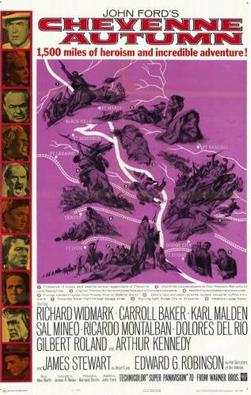
Cheyenne Autumn is a 1964 American epic Western film starring Richard Widmark, Carroll Baker, James Stewart, and Edward G. Robinson. It tells the story of a factual event, the Northern Cheyenne Exodus of 1878–79, told with artistic license. The film was the last Western directed by John Ford, who proclaimed it an elegy for the Native Americans who had been abused by the U.S. government and misrepresented in numerous of his own films. With a budget of more than $4 million, the film was relatively unsuccessful at the box office and failed to earn a profit for Warner Bros.

The Young Lions is a 1958 American epic World War II drama film directed by Edward Dmytryk and starring Marlon Brando, Montgomery Clift, and Dean Martin. It was made in black-and-white and CinemaScope and was theatrically released by 20th Century-Fox. The film is based on the 1948 novel of the same name by Irwin Shaw.

The Facts of Life is a 1960 romantic comedy starring Bob Hope and Lucille Ball as married people who (almost) have an affair. Written, directed and produced by longtime Hope associates Melvin Frank and Norman Panama, the film is more serious than many other contemporary Hope vehicles. The film features an opening animated title sequence created by Saul Bass.
The National Society of Film Critics (NSFC) is an American film critic organization. The organization is known for its highbrow tastes, and its annual awards are one of the most prestigious film critics awards in the United States. In January 2024, the NSFC had approximately 60 members who wrote for a variety of weekly and daily newspapers along with major publications and media outlets.
Stanley Kauffmann was an American writer, editor, and critic of film and theater.
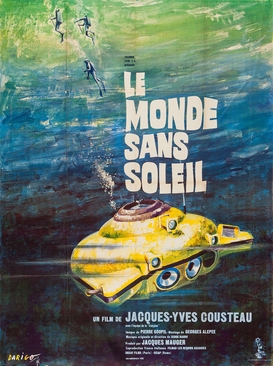
World Without Sun is a 1964 French documentary film directed by Jacques-Yves Cousteau. The film was Cousteau's second to win the Academy Award for Best Documentary Feature, following The Silent World in 1956.
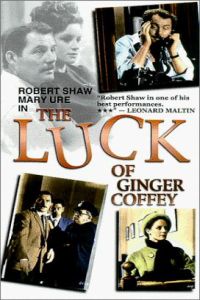
The Luck of Ginger Coffey is a 1964 Canadian film directed by Irvin Kershner. It is based on the Governor General's Award-winning novel by Northern Irish-Canadian writer Brian Moore, published in 1960.

The Spanish Earth is a 1937 anti-fascist film made during the Spanish Civil War in support of the democratically elected Republicans, whose forces included a wide range from the political left like communists, socialists, anarchists, to moderates like centrists, and liberalist elements. The film was directed by Joris Ivens, written by John Dos Passos and Ernest Hemingway, narrated by Orson Welles and re-recorded by Hemingway, with music composed by Marc Blitzstein and arranged by Virgil Thomson.

Goodbye Again is a 1961 American-French romantic drama film produced and directed by Anatole Litvak. The screenplay was written by Samuel A. Taylor, based on the novel Aimez-vous Brahms? by Françoise Sagan. The film, released by United Artists, stars Ingrid Bergman, Anthony Perkins, Yves Montand, and Jessie Royce Landis.
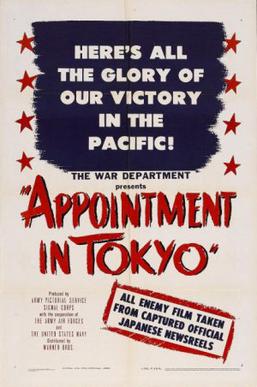
Appointment in Tokyo is a 1945 documentary produced by the Army Pictorial Service, Signal Corps, with the cooperation of the Army Air Forces and the United States Navy, and released by Warner Bros. for the War Activities Committee shortly after the surrender of Japan. It mainly follows General Douglas MacArthur and his men from their exile from the Philippines in early 1942, through the signing of the instrument of surrender on USS Missouri on September 1, 1945.

The Quiet One is a 1948 American documentary film directed by Sidney Meyers. The documentary chronicles the rehabilitation of a young, emotionally disturbed African-American boy; it contains a commentary written by James Agee, and narrated by Gary Merrill. In his 1949 review, Bosley Crowther characterized the film succinctly:
Out of the tortured experiences of a 10-year-old Harlem Negro boy, cruelly rejected by his loved ones but rescued by the people of the Wiltwyck School, a new group of local film-makers has fashioned a genuine masterpiece in the way of a documentary drama.
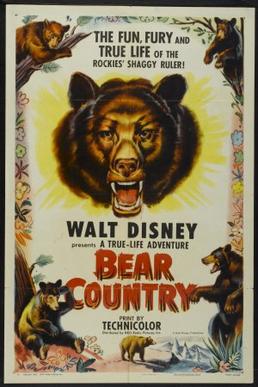
Bear Country is a 1953 American short documentary film directed by James Algar. It won an Oscar at the 26th Academy Awards in 1954 for Best Short Subject (Two-Reel). The film was produced by Walt Disney as part of the True-Life Adventures series of nature documentaries, and played with Peter Pan during its original theatrical run.

A Time Out of War is a 1954 American short war film directed by Denis Sanders and starring Corey Allen and Barry Atwater. In 1955, it won an Academy Award for Best Short Subject (Two-Reel) at the 27th Academy Awards, first prize at the Venice Film Festival Live Action Short Film category, and a BAFTA Special Award, among others.

Design for Death is a 1947 American documentary film that won the Academy Award for Best Documentary Feature. It was based on a shorter U.S. Army training film, Our Job in Japan, that had been produced in 1945–1946 for the soldiers occupying Japan after World War II. Both films dealt with Japanese culture and the origins of the war.

Canon City is a 1948 American film noir crime film written and directed by Crane Wilbur. The drama features Scott Brady, Jeff Corey, and Whit Bissell, along with prison warden Roy Best playing himself. The film takes its name from Canon City, Colorado.
